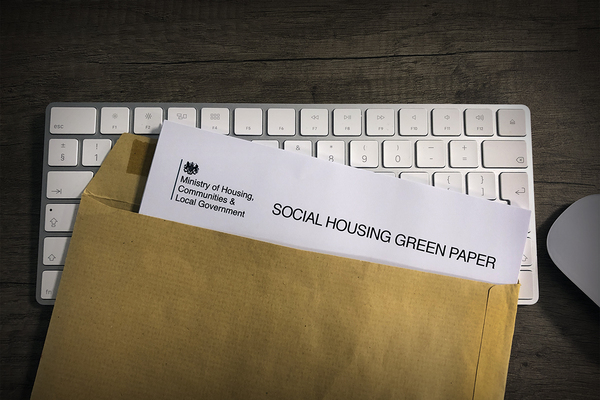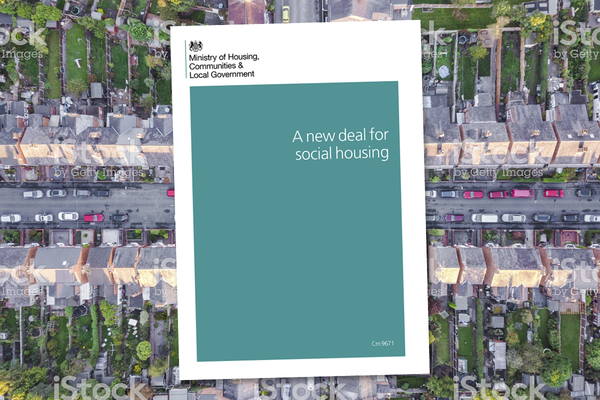MHCLG should not try to control tenant engagement events
Martin Wicks reports on the latest in a series of tenant meetings about the Social Housing Green Paper and explains why he was disappointed with what happened
A hundred council and housing association tenants from across the West of England met in Bristol last week to discuss the Social Housing Green Paper at an event organised by PlaceShapers on behalf of the Ministry of Housing, Communities and Local Government.
Housing minister Kit Malthouse was due to attend but cried off on the grounds of having to be present at Westminster for the Budget vote.
We were shown a brief video message from his good self. His guarantee to us was that “so long as I am in this job you will see action.” The assembled tenants burst out in laughter at his ill-chosen words.
Even the civil servants struggled not to laugh. Minister number how many? Kit who?
“The senior civil servant told the tenants what we thought, choosing which ones to highlight and which ones to ignore.”
These events (we had one with Alok Sharma last year) are most interesting for the discussions that take place among the tenants, who are broken up into groups to discuss the issues.
However, there was a civil servant on each table taking notes to hand up to their boss.
She read out her choice of our responses.
The senior civil servant told the tenants what we thought, choosing which ones to highlight and which ones to ignore.
Only 15 minutes were allowed at the end for open comments from tenants. This particular session was only two and a half hours, even shorter than the previous one we had with Alok Sharma.
Tenants from the same towns were divided up, so we did later get feedback from the different table discussions. What were the range of views?
There was unanimity on the need for more social housing and opposition to ‘affordable rent’. Tenants clearly want more ‘social rent’ homes and an end to (unaffordable for many) ‘affordable rent’.
There seems to be growing support for ending the Right to Buy (RTB) given the desperate shortage of social housing.
Even if the holy grail of ‘one for one replacement’ was actually implemented, it would only create a standstill position. RTB has an even greater impact in rural areas, where many of the tenants present came from.
“The government has discovered that stigmatisation is a problem, but has yet to admit that it is a problem of its, and its predecessors’, making.”
They bemoaned the impact on the younger generation, many of whom are forced to leave their local areas because of the shortage of genuinely affordable homes for rent.
The scale of the shortage was reflected by the story of one tenant, previously a rough sleeper, who has been languishing in temporary accommodation for three years.
There is a great deal of anger over the question of stigmatisation of council and social housing tenants.
Indeed, use of the word ‘bitterness’ would not overstate the case. The government has, apparently, discovered that this is a problem, but has yet to admit that it is a problem of its, and its predecessors’, making.
Despite the honeyed words about social housing the green paper still exhibits worship of homeownership.
I recounted to the young civil servant on my table the story told by journalist Simon Jenkins. When he was a senior civil servant Margaret Thatcher was for a brief period opposition spokesperson for housing.
As a new shadow housing minister he offered to take her on a tour of London to show her some examples of good and bad council estates.
She replied, that “there are no good council estates”. Therein lie the roots of stigmatisation of council estates and council tenants, in such attitudes and the subsequent fire sale of Right to Buy.
Social housing tenants feel this deeply because for many years the mass media has insulted them with its propaganda, which labels them as failures, ‘dependent’ on benefits, if not benefit cheats.
You may recall George Osborne recounting the parable of the person on benefits with the curtains still drawn when the apocryphal ‘hard working’ person was leaving the house to go to work.
Tenants come along to these events more in hope than expectation. You don’t often get the chance to tell a minister what you think, so why not try, at least. They do provide an opportunity to meet tenants from different areas.
“If it wants to hear what tenants think then the department has to take it on the chin, because there is a great deal of anger about the impact of the housing crisis.”
Tenants who often feel that they are banging their heads against a brick wall see that there are tenants in other localities, like them, who are having similar battles and share many views. That’s probably the saving grace.
Yet the message that needs to go back to the ministry is that it should not try to control these events.
If it wants to hear what tenants think then it has to take it on the chin, because there is a great deal of anger about the impact of the housing crisis on them and their wider families, as well as the poverty which people are forced to endure.
The big absence from the green paper, it was noted, is funding for building Theresa May’s “new generation of council housing” (the words in her introduction).
There is no grant available.
“These events are most interesting for the discussions that take place among the tenants.”
The Conservative government ignores its own party’s councillors. None other than Lord Gary Porter has pointed to the fact that the last time 300,000 council homes were built, 40% and more of them were council homes. “We have to get back to that,” he said.
We cannot get back to that without serious government grant to support new building. Borrowing alone is not sufficient.
Certainly tenants appreciate the need for serious levels of grant if the housing crisis is to be addressed.
Martin Wicks, secretary, Swindon Tenants Campaign Group
Social Housing Green Paper: full coverage
All our Social Housing Green Paper coverage in one place:
Green paper measures are not enough to create May’s ‘new generation’ of council homes Green paper proposals are welcome but much more is needed to support councils to build, writes John Bibby
Green paper shows ministers now see associations as trusted partners Focusing on the failure of the green paper to address supply misses the point, writes Boris Worrall
Government should focus on building on what is already strong Philippa Jones considers the Social Housing Green Paper through a slightly different lens
We need more than a week of delayed announcements bundled together Jules Birch reflects on the government’s ‘Housing Week’ announcements
The regulator should monitor how associations assist homeless people Government announcements this week are positive, but any enhanced role for the English regulator should include looking at homelessness prevention work, argues David Bogle
The regulator’s role should be limited to dealing with systemic failures Julian Ashby suggests the Housing Ombudsman Service should deal with all complaints
The green paper shows ministers are in listening mode Despite some glaring omissions, the government appears to be in listening mode and it is important the sector takes advantage, argues Emma Maier
A short history of social housing league tables Attempts to create league tables for housing associations are nothing new. Mervyn Jones looks at how they have worked in the past
League tables could prove blunt and counter-productive, sector warns Housing figures criticise government proposals to measure social landlords against performance indicators
Government ‘must decide how proactive regulator should be’ on consumer standards Ministers now face a dilemma over the regulator’s focus, sector figures say
The Green Paper: a golden opportunity missed? Melanie Rees assesses the Social Housing Green Paper against recommendations drawn up by the Chartered Institute of Housing and finds the government comes up short
Longer strategic partnerships and guranteed debt to boost social housebuilding The Social Housing Green Paper outlines key ways of boosting supply
The green paper is remarkable progress but it is still not enough The green paper suggests the government appears to be re-writing much of its policy since 2010, but more needs to be done, writes Jules Birch
Green paper marks a ‘milestone’ on resident involvement The government’s recognition residents need clear information is to be welcomed, now it up to the sector to embrace tenant involvement, writes Paul Hackett
Ministers consider stock transfer programme to community-led associations The stock transfer programme could be revived under proposals in the housing green paper
Access to housing grant could be tied to new league tables Grant could be awarded according to how well landlords meet performance indicators, the paper suggests
Ofsted-style regulation of tenant services proposed The government is considering expanding the Regulator for Social Housing’s remit to intervene over tenant services and give it a more “proactive approach to enforcement”
Government proposes dropping one-for-one Right to Buy replacement commitment A consultation paper published alongside the green paper proposes a broader measurement to replace the one-for-one pledge
A list of recent housing policy U-turns The green paper confirms yet more housing policy U-turns from the government, which has spent the past two years dropping policy ideas developed under the David Cameron government. Here is a rundown of the major changes in policy direction
Sector welcomes green paper but calls for more ‘ambitious investment’ Reaction to the proposals, from the National Housing Federation, Chartered Institute of Housing and more
Morning Briefing: reaction to green paper announcements how the media reported the proposals trailed by the government overnight
Government drops plans to force councils to sell higher-value stock The government drops plans to force councils to sell higher value homes
League tables and ‘sharper teeth’ for regulator in social housing green paper Ministers reveal some of the things in the paper ahead of its publication
Grenfell survivors: green paper does not go far enough survivors of the Grenfell Tower fire have said the measures published in the Social Housing Green Paper do not do enough to rectify issues in the social housing sector














